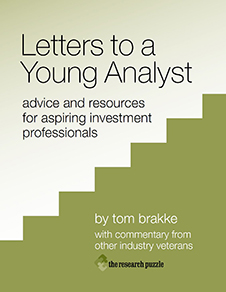
- Monday, June 14th, 2010
- courage and process
-
There is much attention paid to the proclaimed gurus of the investment world, and there have been a number of postings on this site about such leading lights and what it means to be a follower of them.the research puzzle | Here are links and descriptions for some of those postings. It’s time to return to the topic, this time by reviewing the thoughts of Seth Klarman.
Although he appears not to carefully cultivate and capitalize upon his guru status like some others, Klarman has pulled back the curtain a little of late, agreeing to be interviewed by Jason Zweig at the 2010 CFA Institute Annual ConferenceAdvisorAnalyst.com | An official transcript has apparently not been produced. This one was created by Cameron Wright. and being the subject of recent pieces in AR: Absolute Return + AlphaAR: Absolute Return + Alpha | This publication, with one of the clumsiest names in the media world, focuses on the hedge fund industry. A free trial is required to see the interview. and Bloomberg.Bloomberg | This is the online version of the story.
It was a line from Klarman’s interview with Zweig that spawned this posting and its title: “Courage is a function of process.” While the interview and the articles include some information on the “what” (specific investment ideas and considerations), of greater interest are the fundamental elements of “how” and “why” that underpin the strategies of Baupost Group, the fund organization that Klarman leads. The specific ideas will change; the philosophy is foundational. That’s what investors should analyze and emulate.
But only if it makes sense for them. In the AR article, Klarman says that your approach must fit your character. If you aren’t willing to wait around for opportunities, don’t enjoy looking for bargains, and can’t bring yourself to lean against the conventional wind, then “you’re not a value investor, and you shouldn’t be one.” Know thyself is the first principle of investing.
And Klarman’s way is to stand apart. The staff of Baupost is small in size and structured differently than most investment organizations. The firm is painted as a place where a fierce war of ideas is fostered, but without much of the hubris, finger-pointing, and drama that so easily destabilize the culture at other firms. Anyone dealing with Klarman better be on his toes and ready to analyze without pleasantries; according to Jim Grant, “He comes out and says what’s on his mind and expects you to be blunt and direct as well.” And, apparently, he isn’t too worried about how big his pile of dough is versus others: “I feel great knowing I made a fraction of what I could. The key is doing right by clients, not making more money for myself or partners.” How refreshing.
Speaking of those clients, Klarman repeatedly stresses how critical it is to pick the right ones. He realizes that by taking money from those who may be likely to leave at just the wrong time, an organization has a weak base from which to execute its strategy. In a business where everything flows from the level of assets under management, it is difficult but helpful to turn clients away whose behavior is likely to work against you in the long run.
Klarman looks for “idea fluency” among those he works with, so that if he presents a thesis, “I want people to immediately come up with 10 places to look to exploit it.” Instead of running to the standard playbook of the day with everyone else, he tries to gain a different perspective, no doubt why he is noted for his ability to deal with “complicated situations.” One benefit of that approach is that there are fewer players competing with Baupost on many of their ideas. (It is also the reason that Klarman is not easy for the crowd to clone: The strategies can be hard to execute, especially for individuals.) Positions are approached within a framework of sensitivity analysis and an assessment of the probabilities; knowing as much as you can about the structure of an idea in advance aids in finding the right approach for executing it and in dealing with the vagaries of price movement thereafter.
Once the preparation is in place, you have to know opportunity when you see it, and, according to Klarman, the financial crisis was a “wonderful time to put money to work.” As difficult as it is to buy in the face of that kind of tumult, perhaps even more elusive is the ability to stay out of the game when it is being played in a manner that doesn’t make sense to you. Sitting in cash is not the way of the investment world, but it is an essential element of the Baupost way. “We make money when we buy,” says Klarman. The right price is everything.
Process is something that needs to be evaluated time and again, not a boilerplate explanation that appears in a pitch book year after year without examination and reflection. As indicated by the referenced sources, Klarman spends a great deal of time thinking about the “how” of it all and has put the pieces of the puzzle together in a unique and a successful way. No matter your particular investment strategy, that is where you need to start, and where you need to return, over and over. The real gurus are those that help us to think through the path to investment ideas, not those that pitch us their latest ones. If we listen and learn, maybe someday we’ll have the courage it takes to invest wisely and well.
